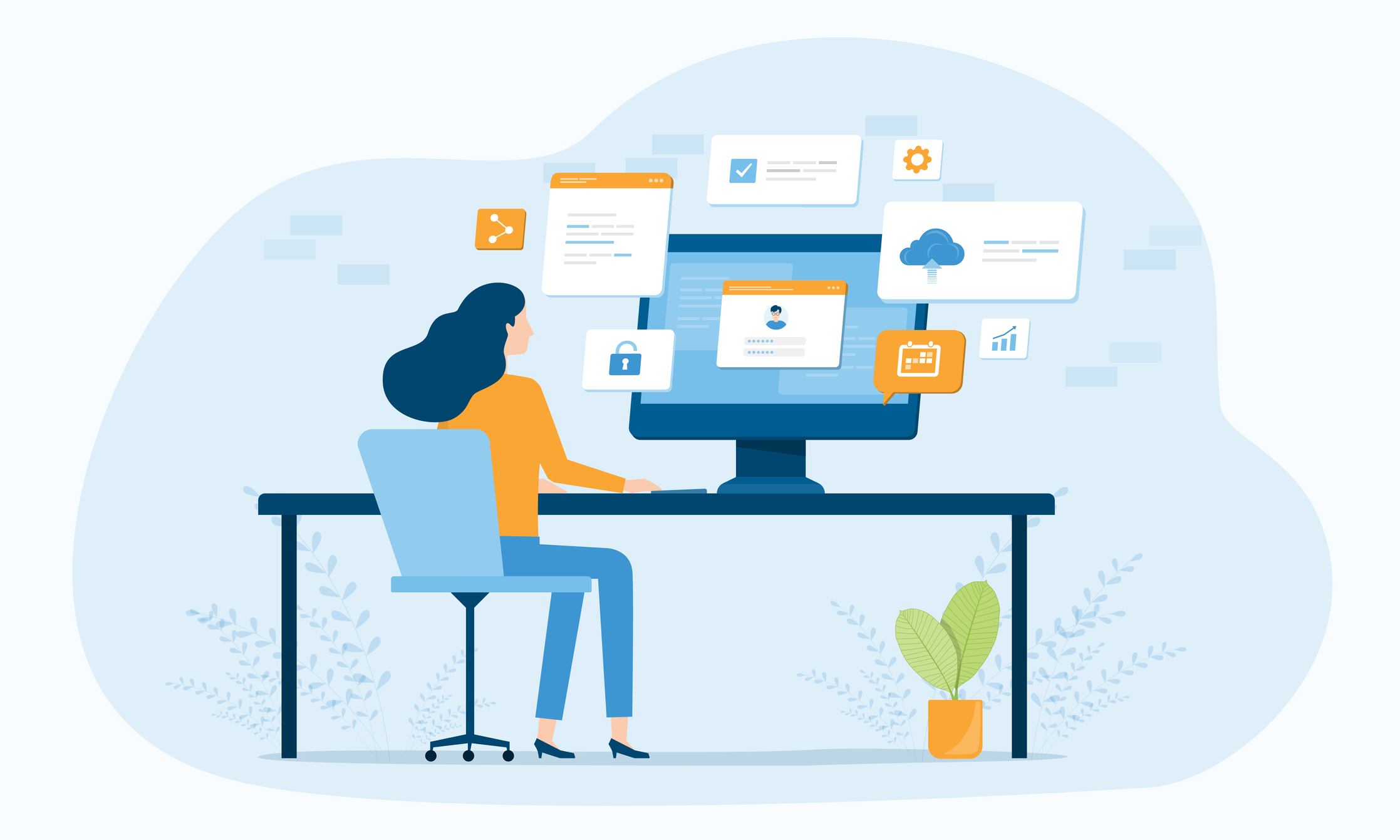This fall will be the first time living away from home for many young people as they pursue college education. Some students will find it easy to adapt to their newfound independence while others may find themselves struggling to handle the added financial responsibility.
Rising tuition costs saddled on young adults, who may be unprepared to handle the stress of financial independence, can be a recipe for disaster. In 2023, the average graduate in America leaves college with more than $37,000 in debt, including federal student loans and the number can be even higher for those with private loans. When it comes time for a young person to leave the nest, financial literacy skills (budgeting, money management) can make all the difference.
Here are some tips for those high school graduates preparing to take the leap into financial self-reliance.
Learn How to Create a Budget
Budgets are your friends, and they are easy to make! First, calculate your expected income per month, including paychecks (if you have a job), grants, loans, and family contributions. This gives you an idea of how much money you have available each month and allows you to plan your spending on needs such as groceries, transportation, and so on. Once you have your needs accounted for, whatever is left can be used for saving, trips, or simple pleasures, ensuring your college experience is enjoyable without worrying about whether you can pay for basic needs.
Don’t Rack Up Debt
The idea of a student credit card sounds appealing but can be a trap for the unprepared. With proper credit card usage, a young adult can establish a record of credit card payments that help them build credit, making future loans and purchases easier. However, if the student treats their credit card like an infinite source of cash, high credit balances and missed payments could prolong the time it takes for them to get on their feet after graduation.
Some simple rules to follow when signing up for a credit card:
- Start with a prepaid card to get into the habit of budgeting. You can keep an actual credit card handy in case of emergencies.
- Research spending limits, interest rates, and terms to find the best credit card for your needs. Make sure you are aware of fees and other hidden costs that come with each card.
- Only spend what you can afford to pay back, and make sure to pay off your card in full each month.
Get a Part-Time Job
A part-time job is not only a great way to help mitigate the costs of higher education; it also provides valuable experience and helps young adults to build community and sharpen organizational skills. Even entry-level jobs require you to have some work experience and a part-time job is a great way to show initiative on your résumé.
Take Classes on Financial Wellness
Many colleges and universities offer financial literacy programs for their students. You can also reach out to administrators and academic advisors who may have information on extracurricular programs open to students.
Choose the Right Bank
College is an opportune time to find a bank that shares your values. These days, community banks boast the same mobile and online banking tools as large national banks while maintaining strong ties to the communities they serve and holding themselves to higher ethical standards. Many of these banks also offer deposit accounts with lower or zero fees for account maintenance, no minimum balance requirements, overdraft protections, and competitive interest rates. New Tripoli Bank’s Smart Start Checking Account is tailor-made for the college-bound graduate. Our mobile and online banking platform mean no matter which college you head for, you’ll have your bank account right at your fingertips.
PHEAA Student Loans
New Tripoli Bank has also teamed up with the Pennsylvania Higher Education Assistance Agency to offer private student loan options for students pursuing higher education. These loans are designed to reduce the financial strain placed on college students by waiving many of the fees associated with loan applications and offering low fixed interest rates.
Keep these tips in mind for those who are college bound. By learning good financial habits early, they will develop the skills they need to become financially secure well into the future.

Sundra Sherwin is Vice President of Branch Administration for New Tripoli Bank. She has over 25 years of banking experience and has been with New Tripoli Bank for 15 years, working in various positions at the Bank. She has been promoting financial literacy in our community through her work with the Bank for years.

New Tripoli Bank offers its most heartfelt congratulations to David R. Hunsicker, President and Chairman, for 50 years of employment with the Bank.
Hunsicker was hired by then- CEO Willard Snyder in 1973 as a teller where he learned the daily operations of the Bank, and then later to positions of increasing responsibility. "Dave did exceptionally well and advanced through various positions and roles within the Bank," Willard reflected. "He was quick to grasp all the challenges I gave him, of which there were many."
"Throughout my career, Willard was a great mentor," Hunsicker said of the former President/CEO, "He encouraged me to attend State and National banking association events, which gave me the opportunity to meet and learn from other successful bankers."
In 1982, Hunsicker was promoted to Vice President and expanded his purview to include commercial lending. He was then promoted to Executive Vice President in 1987. On January 1st, 1996, he was selected to succeed Willard Snyder as Chief Executive Officer of New Tripoli Bank, becoming President and Director of the Board that December. He then assumed the additional role of Chair of the Board in 2011.
Under Hunsicker's leadership, New Tripoli Bank continued to establish itself as the premier community bank in the Lehigh Valley, weathering several financial crises and opening two additional bank branches in Orefield and Upper Milford Township.
"On behalf of the Board of Directors, we thank Dave for his decades of service," said Larry Oswald, Vice Chairman of New Tripoli Bank's Board of Directors. "New Tripoli Bank would not be the Bank it is today were it not for Dave's vision, leadership, and guidance. We have tackled many challenges over this time and Dave's steady hand at the helm made it work, and work well. Thanks Dave, and best wishes as you continue forward!"
John M. Hayes, who succeeded Hunsicker as CEO in 2022, commented as well, "Dave is the best community banker I have ever had the privilege of working with. His knowledge of the industry and the communities we serve is encyclopedic. He has accomplished great things at New Tripoli Bank, and we can't thank him enough for the amazing work he has done."
Asked about the bank's future, Hunsicker said, "I have always believed in our motto: 'People are More Valuable Than Money.' This is our competitive advantage and will continue to be going forward. As long as we continue to provide the best in personal service, we have a great advantage over other financial institutions."
In addition to his work for New Tripoli Bank, Hunsicker has served on the boards and regional committees of numerous trade associations, including the PA Bankers Association, PA Association of Community Bankers, Atlantic Community Bankers Bank, and the Independent Community Bankers of America. In addition, in 2013 he was appointed to the board of the Federal Reserve Bank of Philadelphia where he served for six years, including four years as Chair of the Audit Committee. Hunsicker considers this a highlight of his career. "It allowed me to work with different Federal Reserve Banks across the country," he said, "I learned from other industry leaders and what makes the U.S. economy special."
Reflecting on his career path, Hunsicker said, "When I joined New Tripoli Bank I thought, if I worked hard, someday I may have a chance to be CEO. I always enjoyed finance and banking; both areas were perfect matches for me. New Tripoli Bank allowed me to make my community a better place; I have had the best job ever, and I will always be thankful for the opportunity."
What is an Account Takeover?
Account takeover is an attack in which cybercriminals seize ownership of online accounts by using stolen passwords and usernames, then use these credentials to commit fraud. They purchase personal information via the dark web—information collected through social engineering or data breaches. This information provides the necessary credentials for a fraudster to pose as a consumer. With this information, scammers can trick a consumer's financial institution to make changes to their accounts or card settings. They may change phone numbers, emails, or passcodes, apply for increased limits, or change the account holder's PIN and/or travel exemptions to interfere with the institution's fraud-monitoring tools.
Schemes that Contribute to Account Takeovers
Skimming & Malware
Deployment of card skimmers or malware to point-of-sale terminals continues to be a widespread method for stealing data. Compared to years past, small local businesses are more likely to compromised and have their data harvested. Stolen data is then passed through remote, wireless technologies with increasing frequency.
Phishing, Vishing & Smishing
Phishing, Vishing, and Smishing are methods of data theft that involve tricking consumers into revealing confidential information. These schemes use social engineering combined with modern technology to deceive consumers into revealing critical information while disregarding legitimate fraud warnings.
Phishing schemes are becoming both more frequent, more targeted (called "spear-phishing"), and more difficult to identify than in the past. They utilize email to trick consumers into revealing personal information such as passwords or credit card numbers. Rather than relying on suspicious links in poorly designed emails, phishing emails mimic legitimate websites and appear more polished and credible. By using URL shortening tools such as TinyURL, scammers make detection of suspicious links difficult for even the most keen-eyed of users. Red flags can include mistakes in hyperlinks, grammar or punctuation.
Smishing is the fraudulent practice of sending text messages claiming to be from reputable companies to induce consumers to reveal their personal information, such as passwords or credit card numbers. Vishing is the same fraudulent practice enacted via phone calls. In both instances, consumers may be sent a voice or text message with transaction details requesting confirmation from the consumer. When they respond, they may be questioned for account details or asked to call back and provide account information. In some instances, they are sent a one-time passcode and instructed to reply "No Fraud" to the message.
Malware
Malicious software is a significant threat to the security of financial data. One such type of malware is a Man-in-the-Browser attack, where malicious software is installed to a consumer's computer in the background when the user is downloading some otherwise innocuous file. The malware is then able to monitor and hijack user web sessions to transfer funds or harvest payment cards and online banking credentials, while redirecting the consumer to a fictitious error page. This type of malware often deploys automatically when a user visits a compromised website.
How Should Consumers Protect Themselves?
Preventing account takeover is a joint effort between your financial institution and yourself. There are steps you should take to ensure you don't end up the victim of identity theft.
- If you are concerned about an automated message, do not respond to the call, text, or email. Contact the company in question via their official customer service number listed on their website. Do not contact any number provided by a suspicious caller or message and do not click on any links.
- Respond quickly if you notice unexplained activity on your accounts or suspect you may have been the victim of a data harvesting scheme. Contact your financial institution immediately to help mitigate your losses.
- Always be aware of what information you choose to submit online and never easily provide access to your personal information.
- Maintain an up-to-date, secure operating system along with robust security and anti-malware software. Rely on multiple layers of protection and security tools.
- Keep your two-factor authentication codes private. Never provide them via phone, text, or email. These should only be used to sign into banking, merchant, or payment accounts when the consumer is actively trying to access it.
If you’ve ever wondered if it matters where you deposit your hard-earned money, let me assure you it does.
We know there are more options for where to bank today than ever before. But consider this: community banks like New Tripoli Bank offer benefits to consumers that you can’t find at regional or national banks. Whether you’re looking for personal banking options or services for your business, here are some reasons why your best decision is to bank locally.
Personalized Attention
Do you feel like you’re just an account number in a sea of account numbers, or that you’re always having trouble getting someone to pay attention to you? You’re at the wrong bank.
Community bank employees dedicate more time to the customer. They can respond to your needs with personalized solutions that fit the situations you face because they face the same situations in their own lives. That’s why customers prefer local banks, where customer service truly matters.
Faster Decisions
At a community bank, you speak directly with the people who make the decisions, and we keep those decisions local. You won’t have to wait for your request to make its way through an internal bureaucracy only for someone you’ve never met to weigh in on your request. That’s not fair to you and often leads to bad, poorly informed decisions.
Fewer & Lower Fees
Did you know that large banks have reported making nearly $2 billion annually just through overdraft charges? Or that 75% of large banks don’t offer a checking account without fees? This is just one of the reasons why large bank customers end up feeling like they’re just another name on a ledger.
Community banks charge lower fees than national banks. The most common types of fees—overdrafts and nonsufficient funds fees—are 13-19% lower for small banks compared to large banks. We also don’t look to layer fees upon fees, and work with you to avoid these situations, giving you access to a host of tools to help you manage your money and avoid unnecessary fees. It’s not in either of our interests to charge fees for everything. Additionally, 44% of small banks have checking accounts without monthly maintenance fees—and New Tripoli Bank is one of them!
High Quality Service
Large banks would have you believe that they alone can offer the most convenience and the latest technology, but nothing could be further from the truth. Community banks offer the same services and products as our competitors and often without charging you extra for their use! New Tripoli Bank has world-class online and mobile banking options to improve our customers’ experience, with features such as account alerts, online account opening, automated bill payments, and more.
Ethics & Stability
If the last two decades have taught us anything, it’s that scandals strike larger banks with a fair amount of regularity. The same cannot be said for community banks, who are deeply rooted within the communities they serve and have a personal stake in the financial well-being of their customers. Reputation is important to community banks, and we hold ourselves to a higher standard.
Keeping Money in the Community
Most importantly, your local community bank puts your money to work fueling small local businesses. As small businesses themselves, community banks recognize their key role in keeping their local economy strong. This is why, year after year, community banks are responsible for the lion’s share of small business loans and often serve as the only physical banking presence in one-third of counties in the United States.
Now that you understand the benefits and importance of community banking, the only question left is “how do I get started?” Luckily, New Tripoli Bank’s free checking account is a great way to take advantage of the convenience and simplicity of community banking, and you can set it up 100% online or at any of our three offices. No matter which way you come in the door, we’re happy to have you here!
I hope this article has been helpful at illustrating the positives of community banking and no matter where you choose to bank, just remember to keep it local.
We have recently received a number of calls from New Tripoli Bank customers who have been contacted by someone claiming to be from the bank and asking for personal information. These calls show up on the customer's phone with the caller ID saying they are from New Tripoli Bank, but the actual phone number of the caller is not one associated with the bank.
This is a common tactic used by scammers to create a sense of trust in their targets, to make them more likely to give up information. We want to remind our customers that New Tripoli Bank will never request a customer's personal, confidential information (bank card number, account number, social security number, personal identification number, or password) through telephone contact. If you should ever receive a telephone call requesting your personal confidential information that appears to be from New Tripoli Bank, do not respond to the caller and contact us immediately at (610) 298-8811.
You can learn more about how to protect yourself by reading our articles on identity theft and frauds, scams and phishing along with other topics on our security page.

These days, it seems like we use our computers and the internet for everything. Whether it's sending mail, shopping, checking the news, or keeping in touch with friends and family, chances are you're staring at a computer screen when you do it. While there are many benefits for consumers—faster and convenient services, for example—it is important to be aware of the dangers of the internet.
Wherever you find consumers willing to spend money or divulge personal information, you will find criminals seeking to exploit them for personal gain, and the internet is no different. Every year, millions of people fall victim to frauds and scams that begin with an email, text message, or phone call. The cost on consumers is immense, but they suffer more than just the financial losses: fraud can cause damage to their credit history and can lead to a lost sense of security.
This is why New Tripoli Bank is dedicated to promoting cybersecurity. Strong cybersecurity requires smart internet use—you may have the best security systems installed on your computer, but one wrong link click can lead to you becoming the target of identity thieves!
Here are some tips to stay safe while surfing the web:
Be suspicious of unexpected requests for personal information. It doesn't matter how legitimate the email or website looks—only open emails from people or organizations you trust and, even then, be cautious if anything looks questionable. Keep an eye out for typos or other obvious mistakes—scammers send purposefully sloppy emails to isolate the most gullible targets.
Don't share personal information unless you initiated contact. Do not share info over the phone, through the mail, or via the internet in response to an unsolicited request. If you receive a message that appears to be from an organization you recognize instructing to you call a phone number or click a link, ignore the message, and instead visit that organization's website to use their verified contact information.

Thoroughly review your account statements. Make sure you recognize and can account for every transaction that appears on your end-of-month statements and make sure to contact your bank or credit card servicer if you notice any irregularities or unexpected charges.
Use strong passwords. Avoid using birth dates, phone, numbers of Social Security numbers for PIN codes. Don't create a password based on information that can be found on your social media profile or easily guessed.
Be careful what information you share publicly. It's best to show discretion when using social media; any information you share can be exploited by scammers to make them appear as if they are someone who knows you.
Keep your computer updated. All consumer PCs come installed with security software that you should update regularly to guard from the latest malware and viruses.
Avoid unsecured networks. Be careful about where and how you conduct your financial transactions. Unsecured public wi-fi networks can be intercepted by malicious hackers, and you never know who could be watching you enter personal information while you're out in public.

Stephanie Barton is a Senior Vice President and New Tripoli Bank's Chief Information Officer. She has been working for New Tripoli Bank for over thirty years and has overseen the maintenance and upgrading of the bank's digital infrastructure and security.

We have received an increasing number of reports in recent weeks of customers falling victim to a type of scam known as a tech support scam. In this type of scam, the victim encounters a pop-up on their computer that looks like a normal notification you would receive from your system or antivirus software, often using logos from trusted companies or websites. The notification warns you about a security issue on your computer and instructs you to either call a phone number for help or to click a link to a spoofed tech support page.
There are a number of things scammers will try to do in these types of scams:
Install malware on your computer. Scammers will pose as tech support in order to convince you to give them remote access to your computer and then pretend to run a diagnostic test. What they are actually doing is installing malware or keyloggers onto your device so they can steal your personal information.
Steal personal information. Scammers create phony websites that look like the real deal to prey on your trust and convince you to enter personal information into their fake site, which then allows them to steal your identity and commit fraud.
Ask for money. A scammer will pose as a tech support representative, pretend to fix whatever issue the pop-up claimed was wrong with your computer, and then charge you for their "service." If someone asks you to purchase gift cards as payment, it is definitely a scammer. Legitimate businesses will never ask for gift cards as payment.
If you receive a pop-up notification on your computer that includes a phone number or asks you to click a link, do not call the number or click the link! Security pop-up warnings from real tech companies will never ask you to call a phone number or click on a link. Legitimate tech companies will also never contact you by phone, email or text message to tell you there's a problem with your computer.
Your best defense against these types of scams is keeping your computer's security software up-to-date. If you think you are being targeted by a tech support scam, do not click on the notification and instead have your security system run a scan of your computer for malware. Should you need any help fixing a problem, go to someone you know and trust. Visit your manufacturer's website directly to find online support or a phone number for their tech support.

What To Do If You Were Scammed
If you gave the scammer remote access to your computer, update your computer's security software, then run a scan and delete anything the scan identifies as an issue.
If you gave login information a tech support scammer, change your passwords right away. Make sure you also change the password on any accounts or sites with the same password. Make sure you use a strong password.
If you paid a tech support scammer with your credit or debit card, contact the credit card company or your bank immediately. Tell them what happened and ask if they can reverse the charges.
If you paid with a gift card, contact the company that issued the gift card right away to see if they can refund your money. Remember: legitimate businesses will not ask for gift cards as payment!
New Tripoli Bank donated $2,500 to the Parkland CARES Food Pantry as a show of support for their mission to feed and serve members of our community affected by and suffering from hunger.
“Parkland CARES is extremely grateful to New Tripoli Bank for their generous donation,” said Katrina Sundstrom, Executive Director for the Food Pantry, “The funds will be used to purchase Snack Pack items to feed the over 350 Parkland students who receive the bags each month.”
Parkland CARES opened its doors for the first time in 2019 to just 12 families and by the end of the year had grown to supporting over 100 households. When the COVID pandemic hit in 2020, the pantry switched to a contactless drive-thru model for distribution. Parkland CARES works closely with Second Harvest Food Bank, Orchard Hills Church, and many other community partners to fulfill its mission to feed the less fortunate in our community.
“The health and well-being of families is important to New Tripoli Bank,” said John M. Hayes, CEO of the Bank, “We see the amazing work that Katrina and the rest of the Parkland CARES team are doing to provide support for those who need help. We are glad we can help them continue to meet our community’s needs.”
 Pictured from left to right: John M. Hayes, New Tripoli Bank CEO, Katrina Sundstrom, Parkland CARES Executive Director, Michele Hunsicker, New Tripoli Bank Executive VP & CFO
Pictured from left to right: John M. Hayes, New Tripoli Bank CEO, Katrina Sundstrom, Parkland CARES Executive Director, Michele Hunsicker, New Tripoli Bank Executive VP & CFO
A smart consumer is more than someone who can find the best deal. They know their spending limits, understand their rights and responsibilities as a consumer, and do research before making a purchase. Smart consumers aren’t tempted by impulse purchases or eye-catching red tag sales; they’re focused on finding a reasonable deal on a product that will last.
Here are some tips for you to make the best decisions when you’re shopping online or at a retail store.

Before Purchasing
Know what you can afford. Keep track of your monthly finances and determine how much money you can afford to spend after paying for groceries, bills, and other necessities. Once you have a number, stick to a spending plan to make sure you don’t live beyond your means.
Research the product. It may feel like a lot of work for something as simple as making a purchase, but proper research can help you avoid buying a product or service with a history of complaints or missing a lower price for the same product. Check product reviews for common issues people have with the product. Investigate the company selling the product and make sure you are buying from a reputable seller; check the Better Business Bureau to see if complaints have been filed against the company.
Beware social media ads. There are many ads that pop up on Facebook and Instagram with great deals. Be sure to do your research before you buy. Use Google search to verify the product and seller. There may be scammers that use Facebook ads, advertising great deals to trick you into entering your card information.
Read the fine print. Before you sign a contract for a big purchase or hire someone for a service, make sure you read and understand everything you are agreeing to. Don’t be afraid to ask for clarification if you’re unsure about something and never sign until you are 100% comfortable. Make sure you get everything in writing, and never pay in full until the job is done and you are satisfied with the workmanship.

While Shopping
Make sure to compare prices. Being a consumer in the age of smart phones means instant access to information that consumers in previous generations could only dream of. If you see a product that you’d like to purchase at a retail store, take the time to look it up online and see if other stores are selling it at a better price. Some retail stores offer price matching, so you don’t even need to make another trip!
Be careful with financing options. Companies sometimes offer 0% financing options for larger purchases (for example, window installations and furniture), which can be great for staying within your budget. However, make sure you understand the terms of any contracts you sign, as these offers usually come with extremely high interest rates that you will be required to pay if you fail to make your minimum monthly payment.
Though most shopping still happens in retail stores, many people have switched exclusively to shopping online since the pandemic, which can come with a whole host of problems for consumers who aren’t careful! When shopping online:
Stick to secure, reputable sites. Look for URLs that start with https://. These websites use encryption to protect your sensitive data. Keep an eye out for red flags such as spelling mistakes, malfunctioning features, or a lack of contact information. When in doubt, search the site’s name to see if the search results are filled with articles about frauds related to the site.
Avoid shopping on public wi-fi or public computers. Hackers will often target users on public networks with keyloggers or other methods to steal your information. You also never know who is watching you in a public place, so it is best to avoid entering personal information in such situations.
Make sure to read all contracts and agreements. Don’t click the check box without reading the documentation. It is especially important to read a website’s terms of use to understand how the company plans to use your data and if they share it with other companies.
Look for a return policy. Any reputable company will have a link to their return policy somewhere on the front page of their website. It’s important to understand your rights as a consumer before you buy.

After Buying
Keep a copy of any receipts, warranties, or service contracts. Consider creating a binder to hold all this documentation, as you may need it later to make a claim or in the event of a recall. You should make copies of any receipts printed with ink that could fade quickly.
Be a responsible borrower. If you financed a purchase or used your credit card, make sure you have a plan to pay it back quickly! Try to pay down outstanding balances immediately if you can. You can also contact a credit counseling service for additional help managing debt.
Make a complaint. If you’re not happy with your purchase, contact the seller and give them a chance to fix the problem. If the issue cannot be resolved, you may want to consider making a formal complaint to the Better Business Bureau or the Federal Trade Commission.
It’s easy to be a smart consumer if you arm yourself with the proper tools. A New Tripoli Bank checking account gives you access to our mobile banking tools such as email/text alerts that are customizable to you, which makes keeping track of spending and budgeting even easier. You can download the CardValet app to help monitor your accounts for fraud. Just make sure the next time you go shopping to keep these helpful tips in mind!

Jen Moyer is an Assistant Vice President and head of New Tripoli Bank's Deposit Operations. She has been a member of the New Tripoli Bank team for nearly twenty years and has worked in multiple departments within the Bank.
New Tripoli Bank donated $10,500 to the Cetronia Ambulance Corps to show its support for their organization’s mission to provide emergency medical services, transportation, and community health resources to the Lehigh Valley region.
“New Tripoli Bank is committed to making sure our local emergency services teams have the funds they need to maintain and upgrade their equipment,” said John M. Hayes, CEO of New Tripoli Bank.
Cetronia Ambulance Corps is one of the largest providers of ambulance services in Eastern Pennsylvania, employing 135 full- and part-time career associates, 20 active volunteers and boasting a total fleet of 41 vehicles. As the regional leader in EMS, Cetronia Ambulance Corps fields over 45,000 calls annually, covering an emergency service area that spans across 130 square miles, and a non-emergency coverage area that encompasses five counties. They also provide emergency response training and education programs for groups, businesses, and individuals.
“We are so thankful to be serving this wonderful community that has shown us such great support for the lifesaving work we have been doing for the past 68 years. We look forward to the future and the advances that we can make because of our generous donors,” said Robert F. Mateff Sr., CEO of Cetronia Ambulance Corps, “New Tripoli Bank has been an excellent supporter of EMS over the years, and we can't thank them enough for their community-minded vision.”

Pictured from left to right: John M. Hayes, New Tripoli Bank CEO, Robert F. Mateff Sr., Cetronia Ambulance Corps CEO, Kim Blichar, Cetronia Ambulance Corps Director of Marketing & Public Relations, Michele Hunsicker, New Tripoli Bank CFO
Next Page »« Previous Page
 Log In
Log In

 Log into Online Banking
Log into Online Banking